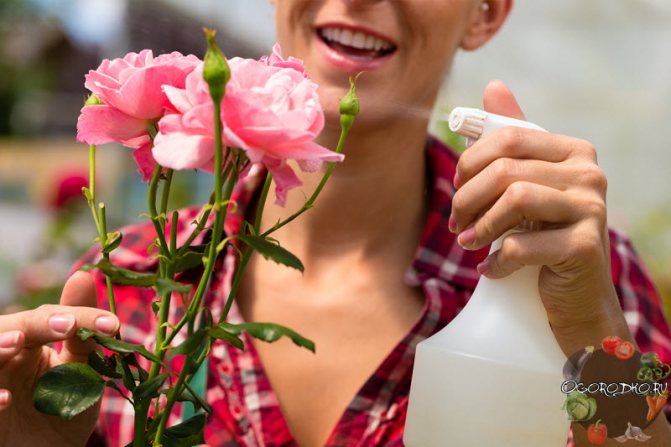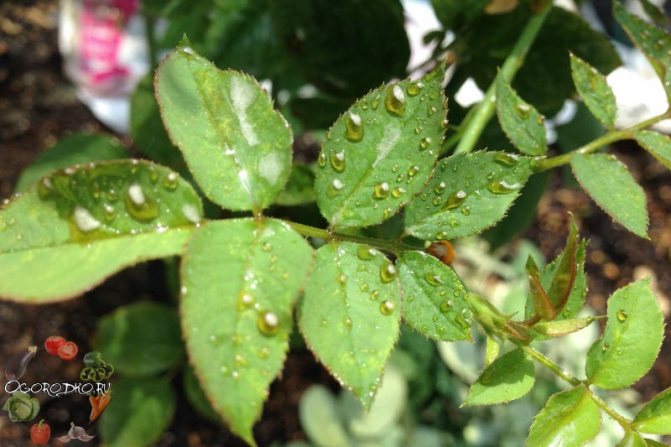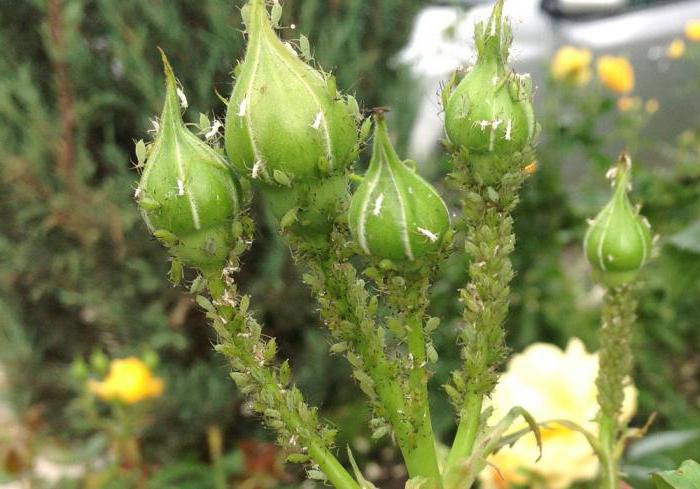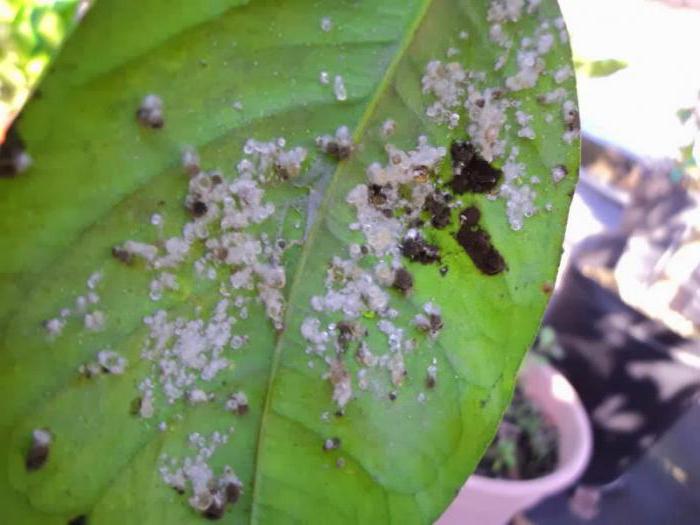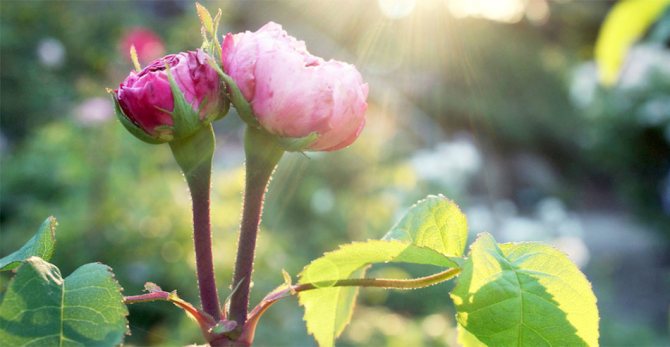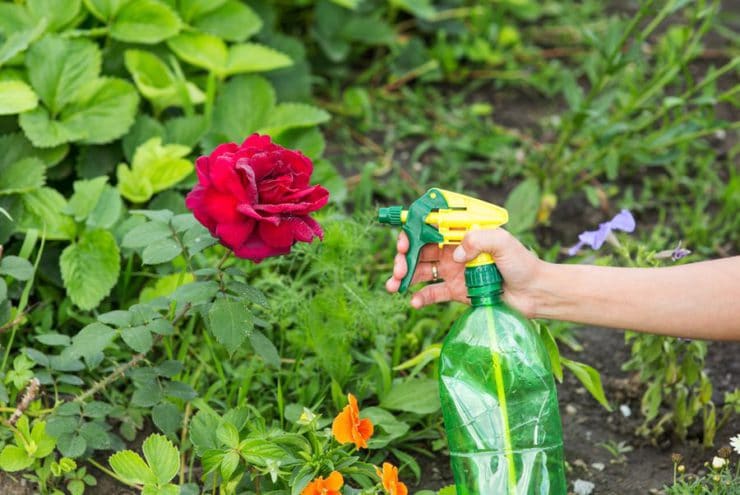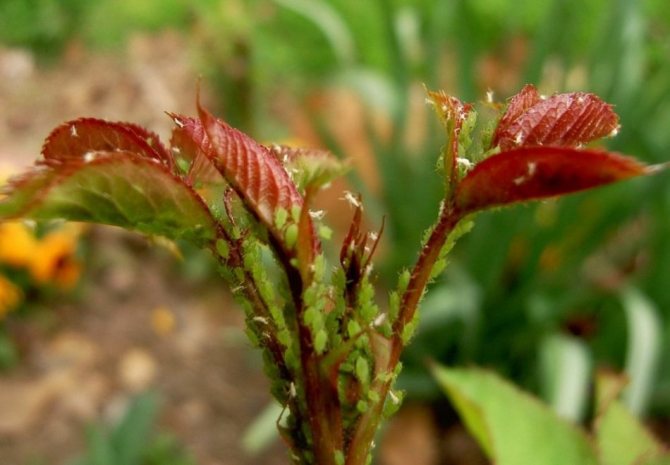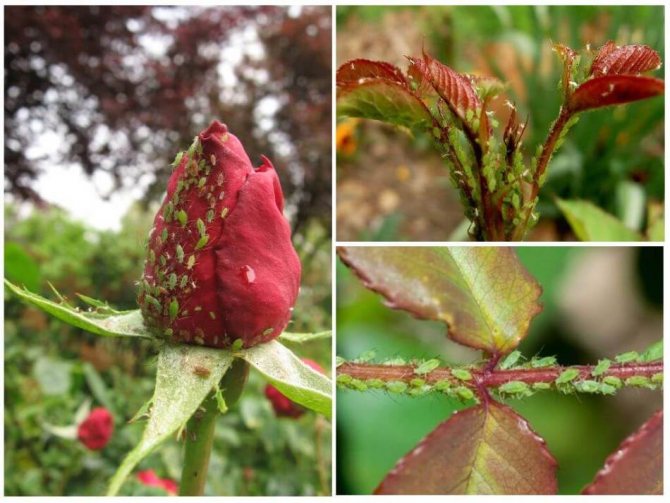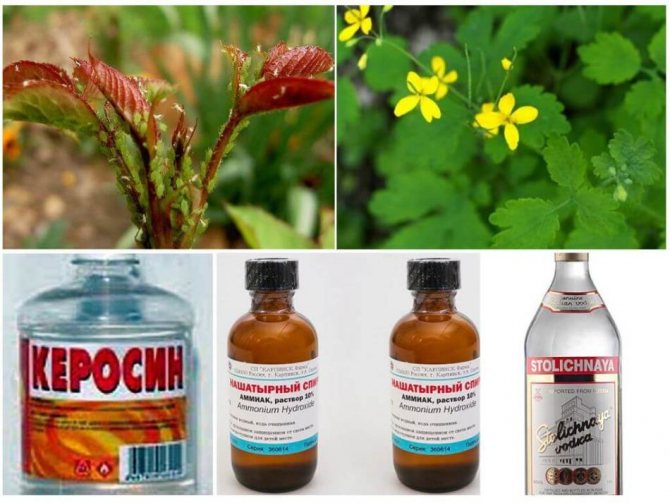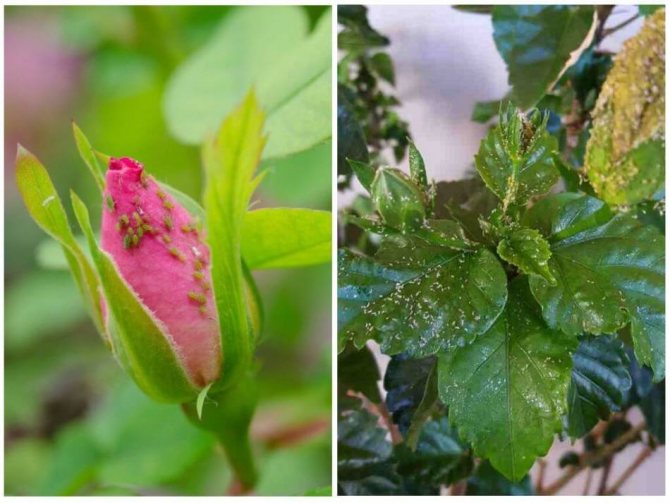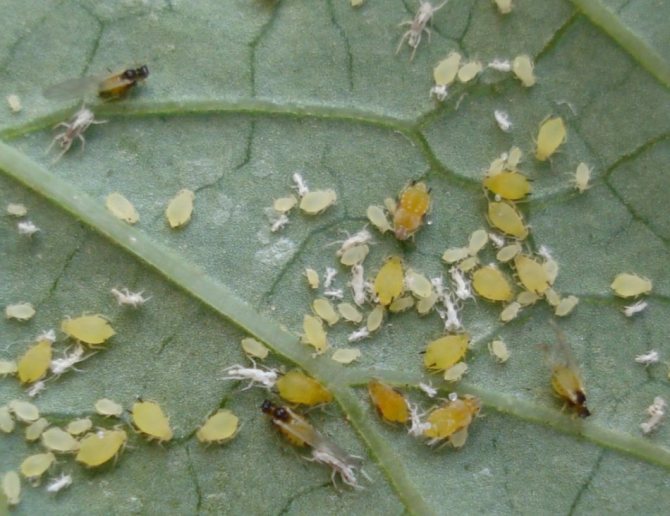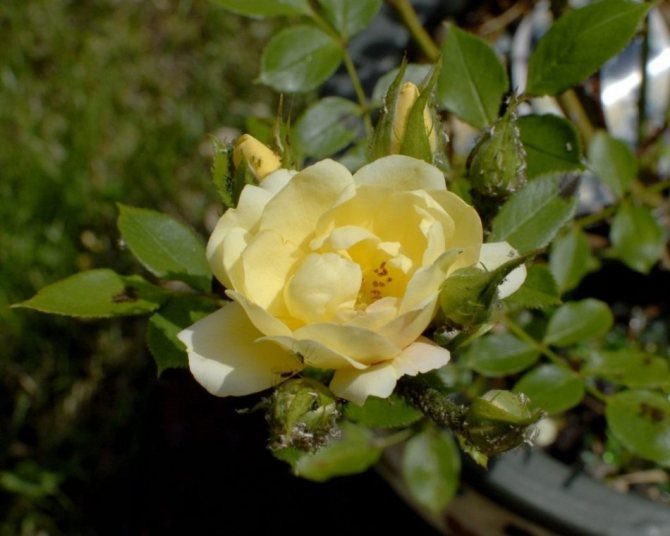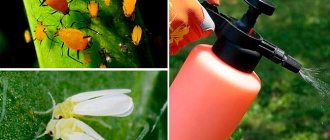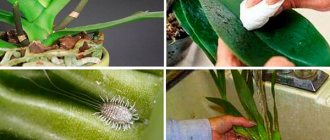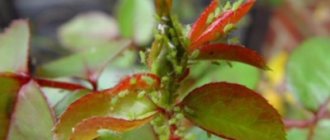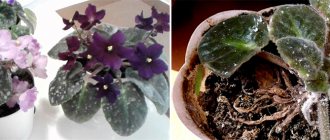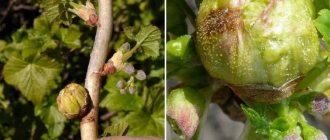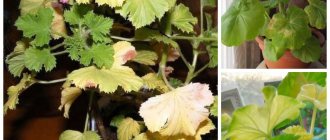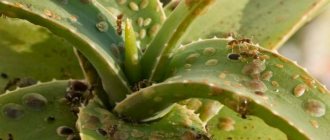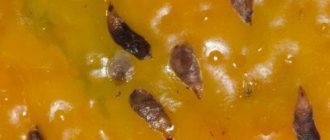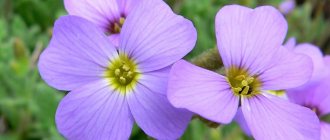Are the rose leaves curled and unhealthy? Most likely - this aphid settled on roses. Unfold a couple of these leaves and you will see the pest with your own eyes. Small inactive insects gathered in the colony and amicably suck the sap of the plant. Green, gray, black, red - all kinds of aphids! And the process is supervised by ants, who now and then run between their "sheep", feeding on their sweetish secretions.
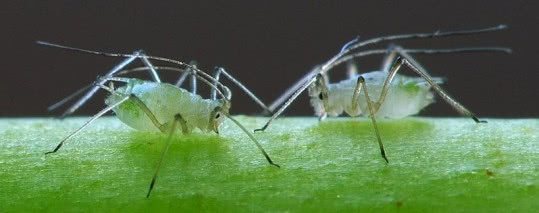
Why is aphid dangerous
As soon as the weather is warm in spring, and fresh shoots and leaves appear on the roses, they are soon attacked by ants that carry aphids. She could overwinter on roses and other plants. The pest tolerates the winter quite comfortably, hiding in the depressions of the bark, the axils of the buds, under fallen leaves and in dry grass. In the spring, the eggs turn into larvae and quickly enter the adult stage.
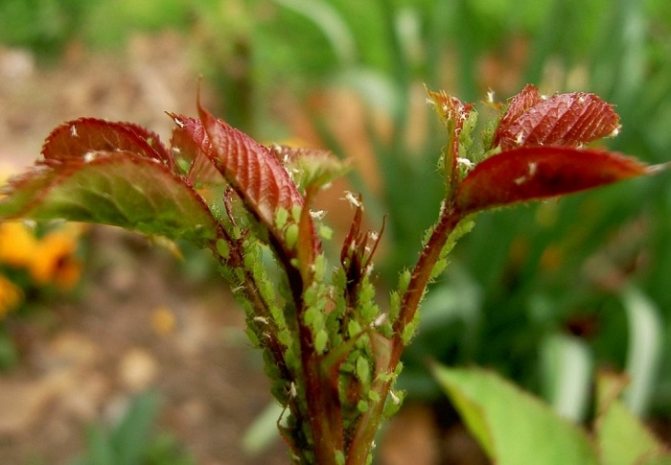

Photo 1. Aphids appear on roses as soon as the leaves bloom.
Small pests feed on plant sap... To get to it, they pierce the shell of the leaves, causing great damage. Because they damage tissues and take away nutrients. The leaves begin to turn yellow, the shoots are bent, the buds wither without blooming. As a result, roses weaken, and multiple wounds inflicted by aphids become a free entrance for infectious diseases. If this is not dealt with, the plant will eventually die.
Unfortunately, the destruction of the pest is not a one-time action. Rose aphid, namely, it affects roses, is very fertile and reproduces from mid-spring to autumn cold. Therefore, control and processing will have to be done throughout the warm season.
You can get rid of aphids by mechanical, chemical and folk methods. The last one is the most demanded. Firstly, because they are safe for roses, people, animals and the surrounding nature. And, secondly, they are affordable and inexpensive. Let's tell you more about them.
Preventive actions
Preventing aphid infestation in roses depends to a large extent on proper care. Timely pruning, regular weed control, and control over fertilizer concentration are key to plant health. But there are aspects that increase the chances of protecting flowers.
Purchase of seedlings
When choosing planting material, you should pay attention to varieties that are resistant to aphid attacks. These include:
- hybrid variety Leonardo da Vinci;
- polyanthus rose Fairy;
- hybrid tea grade Karina.
Their peculiarity lies in the dense structure of the leaves, which the pests are not able to bite through.
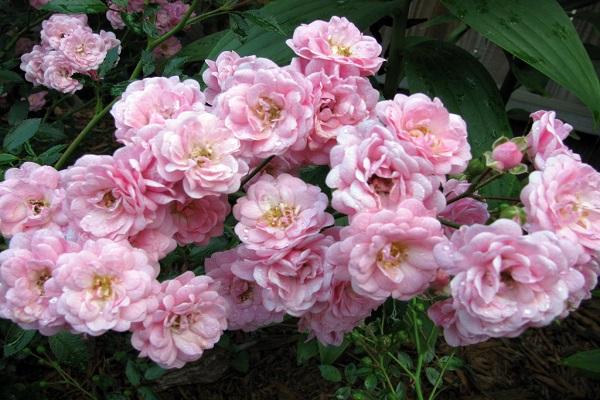

Ant neutralization
Ants are the main pests in the garden. Therefore, control measures should be directed at them as well. Limiting the access of ants to the bush will help:
- tillage of the soil around the bush with semolina or millet;
- fencing the flower bed with sawdust soaked in lavender oil.
You can also kill ants using special chemicals.
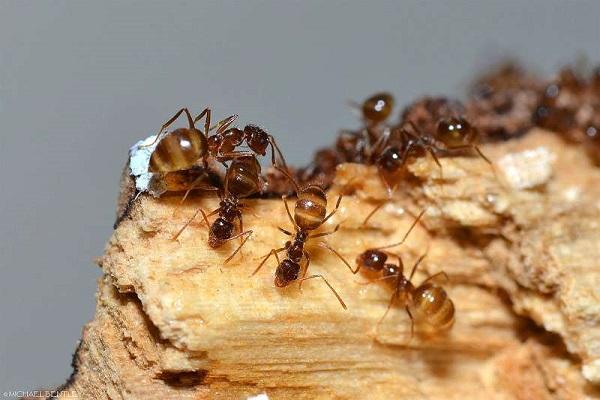

Use of biological helpers
You can fight aphids, as well as prevent its appearance on roses, with the help of plants that have a specific smell. A flower bed with roses should be supplemented with marigolds, mint, sage, garlic or dill. The aroma of these crops repels pests.
Among insects, there are also representatives that actively destroy aphids. Ladybugs are considered the most useful in this matter. They are able to destroy entire colonies of pests.
The health of a rose depends entirely on grooming. Careful attention to your pet will prevent the appearance of pests on it and reduce the risk of various diseases.
Mechanical collection of insects
This method is effective if there are few rose bushes. Only then can aphids be harvested by hand. To do this, you need elastic gloves made of rubber or silicone, a can of water.
Aphids are removed from shoots, leaves and buds by holding them between the fingers and gently brushing them off. Pests are placed in a jar of water so that it does not creep again.
Usually, this work is done when aphids have just begun to appear and have not spread in large numbers. If it is difficult to pick up pests by hand, it can be washed off with a strong jet of water. Under pressure, small pests fall to the ground and cannot crawl up on their own. For this they need ants. To get rid of them, you need surround
roses by plants, the smell of which they do not like.
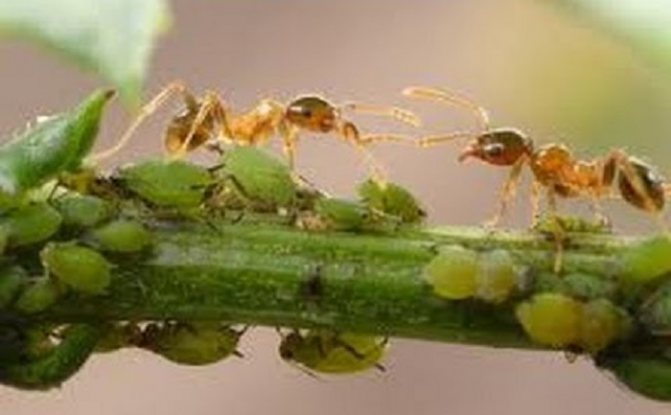

Photo 2. Ants bring aphids at times.
Ants carry aphids on themselves from one plant to another, because they feed on the sweet milk of small pests and are interested in the “breadwinners” settling in comfortable conditions for them. An invasion can be prevented by planting pest-repellent crops around the rose bushes.
Prophylaxis
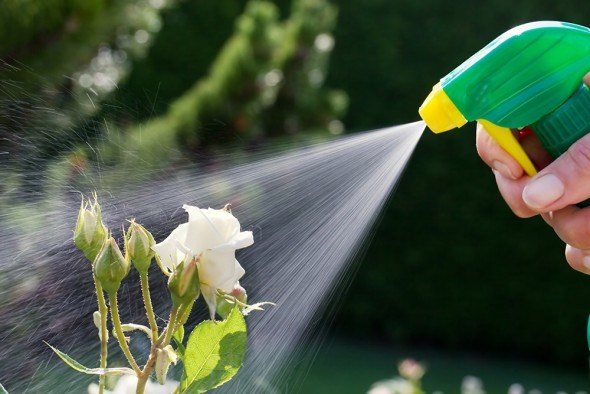

It is important not only to eliminate insects, but also to take preventive measures so that the aphids do not bother you anymore.
It is necessary to fight the ants that carry the insect. Destroy all nearby anthills.
- You can eliminate ants using strips of tape or paper with an adhesive side.
- Another effective remedy is a piece of minced meat with the addition of borax. You can use honey with added boric acid.
- It is recommended to treat the soil near roses with lavender or mint essential oils.
There is no need to chase away the birds that fly in the area and crush ladybirds. For them, aphids are a tasty treat.
From time to time it is necessary to inspect the bushes for the presence of insects. When the first signs of aphids appear, insects should be collected or pressed on the leaves.
To the question "how to process roses" the best solution would be the integrated use of all processing methods. If the aphid has just appeared, then it is enough to collect it with your hands or wash it off with water. If the insect colony already poses a threat to the plant, you should use more radical methods (chemicals or infusions of iodine, garlic, tomato tops). Prevention is also an important control measure, which minimizes the reappearance of insects.
Planting plants with a specific smell
For a long time, gardeners have noticed that if some fragrant flowers and herbs grow next to roses, then there are no aphids on the bushes. This is because ants and aphids do not tolerate their scent.
There are many such protective plants, including decorative and garden crops. Here are the most common ones:
| Decorative flowers | Garden crops |
| Marigolds rejected and large-flowered | Onion |
| Calendula officinalis | Garlic |
| Pyrethrum - Dalmatian chamomile | Parsley |
| Narrow-leaved lavender | Carrot |
| Lovage officinalis | Celery |
| Sage (all decorative species) | Basil |
| Pelargonium | Fennel |
| Mattiola two-horned | Dill |
| Tomatoes | |
| Potatoes |
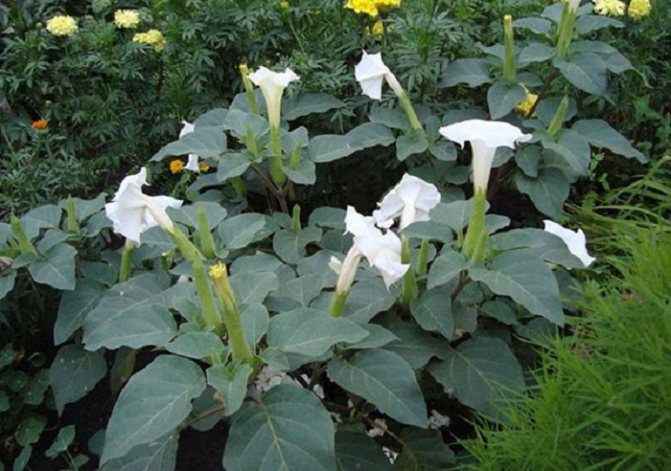

Photo 3. The likelihood of aphids appearing on roses is reduced significantly if insecticide plants are planted nearby. For example, rejected marigolds and common dope (datura).
If these plants surround a rose garden, then the probability of aphid spreading decreases significantly. If, for some reason, it is impossible to plant crops around roses, there is another way of plant protection. Wild odorous herbs are collected in the forest or meadow and spread between the bushes. Such plants have insecticidal properties.:
- Common tansy,
- Wormwood,
- Medicinal celandine,
- Creeping gorchak,
- Datura ordinary (Datura),
- Aconite ordinary,
- Black henbane,
- Horse sorrel,
- Yarrow.
Be careful when preparing henbane, dope, aconite. These are poisonous plants!
Evgeny Pikunov "Poisonous Plants of the Middle Belt", Vitebsk - 2004.
The listed cultures help not only fresh. They are used to prepare homemade aphid remedies for spraying roses.
What kind of aphid insect and the reasons for its appearance
If aphids have appeared on the roses, it is very easy to recognize it and distinguish it from other insects. These are small bugs with an oval-shaped body. Their color can be different depending on the species, age and habitat. So, there is a green aphid: a bug that disguises itself as the color of young leaves and grass. There are also white aphids, and it is even easier to see it by its characteristic milky body color. The bug is transparent, and its length varies from two to seven millimeters, so it is quite possible to notice it with a simple eye and take action in time.
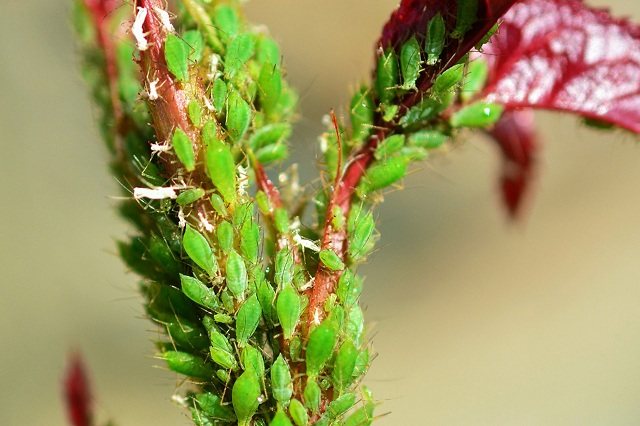

The reasons for the appearance of these bugs, mainly, is that it is the rose that serves as the main delicacy for them, along with other garden crops. The pest wakes up in the month of April along with flowers and shrubs, actively grows, multiplies and spreads in the garden in search of food.
Herbal decoctions and infusions, popular recipes
For insecticidal raw materials to be effective, they are harvested at a certain stage of crop growth. Most often, during flowering and. when young leaves are filled with fresh juice.
If the plants are not used immediately, they are dried in the shade. It turns out dry raw materials that can be used throughout the summer. The blanks are stored in a dark, dry, well-ventilated place in paper or cloth packaging that allows air to pass through well.
Recipes for preparing herbal infusions, methods of application:
| Plant | Dosage | Preparation | Using |
| Pyrethrum Dalman chamomile | 100 g for 1 liter of water | Insist 12 hours | Strain before spraying, add 4 g of soap. Dilute the concentrate with water 1: 3. |
| Ordinary tobacco (fresh crushed leaves) | 400 g for 10 l of water | Withstand infusion - 2 days | After filtration, bring the infusion to 10 l |
| Horse sorrel | 400 g for 5 l of water | Insist 3 hours | After filtration, the product is completely ready for use. |
| Dandelion medicinal (to prepare the infusion, all parts of the young plant are needed - leaves, flowers, roots) | 200 g for 5 l of water | Insist 3-4 hours | Strain before spraying. |
| Peeled onions | 350 g for 5 l of water | Withstand 5 hours | The liquid is ready for spraying after filtration. |
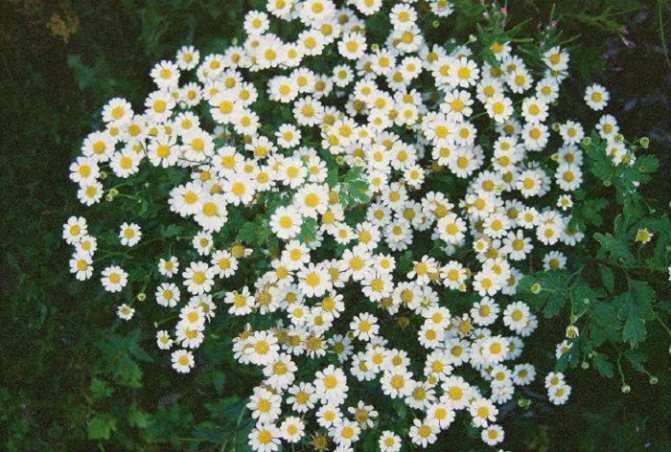

Photo 4. Pyrethrum or Dalman chamomile is one of the most powerful insecticide plants. It was from it that the active substance "peritrin" was first isolated, which is now synthesized artificially, and is part of many chemical pest control agents.
For the preparation of insecticidal broths, the following herbs are used:
Yarrow
Harvesting time - the beginning of flowering.
- The broth is prepared from 1 kg of finely chopped leaves and flowers, filling them with two liters of boiling water.
- Cook for 2 hours on low heat, covered.
- They insist for two days.
Celandine ordinary
- The dosage is 400 g per 1 liter of water.
- Before boiling, leaves and flowers must be soaked in water for 2 days.
- Boil for half an hour.
- After cooling down, dilute the concentrate with water 1: 2.
Tomato stepchildren
Stems and leaves torn off on tomato bushes during pinching are a good means of fighting aphids. Plants of the "nightshade" family contain alkaloids that many insects cannot tolerate. This property has been successfully used to prepare homemade insecticides.
For the broth you will need:
- 5 kg of crushed raw materials per 10 liters of water,
- Pour the tops of boiling water and boil for half an hour over low heat.
- When the broth cools down, you need to filter it, add 30 g of grated laundry soap and add water to 10 liters.
Tip # 1... Instead of tomato stepchildren, you can use the stems and leaves of dope, henbane, nightshade. You need to work with these plants with gloves. Also, make sure that their juice does not get into your eyes or mouth.
In addition to decoctions and infusions, other available and inexpensive substances can be used.
Harm done
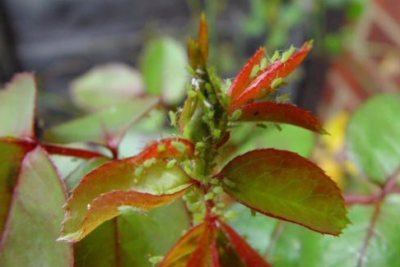

Aphids cause tremendous damage, as they feed on plant tissues and suck out plant juices. Young shoots, flower and leaf buds are most affected by aphids. As a result, leaves and whole branches are deformed and turn yellow, and the buds, not having time to bloom, fall off. The plant affected by aphids weakens, its resistance to diseases and temperature extremes decreases.
Also aphids give off honeydew - sweet and sticky, similar to syrup. These secretions coat the leaves and stems of the rose bushes, making the plant susceptible to fungal infections and increasing the risk of black mold. In addition, aphids are a carrier of viral diseases. Therefore, if a pest is found on both home and garden flowers, it is necessary to urgently begin to deal with it.
Ammonia in the fight against ants and aphids on roses
Ammonia solution is one of the most popular homemade insecticides. It is easy and simple to prepare, but it works effectively.
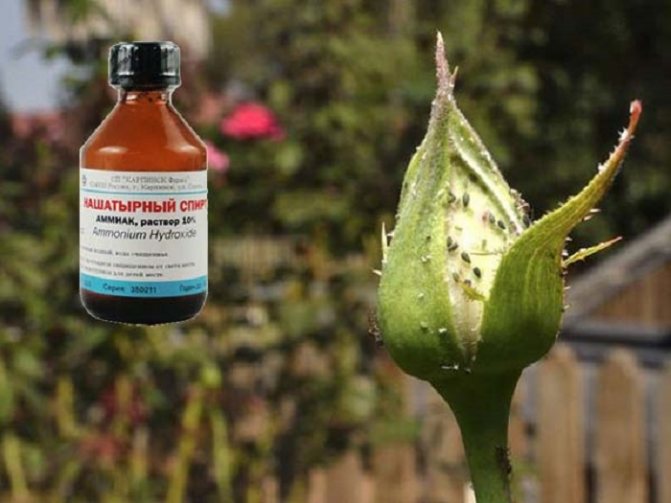

Photo 5. Ammonia is a simple and reliable remedy against ants and aphids on roses.
Experienced gardeners recommend these recipes for killing ants in the garden:
- Pour 100 ml of ammonia with one liter of boiling water.
- Pour hot into the anthill. If it was not possible to find it, then water the path along which the ants bring aphids. Typically, this is one route.
Important! Boiling water can only be poured onto the ground and make sure that it does not get on the plants. For this, it is better to use a kettle.
If you plan to fight ants and aphids on the stems, leaves and flowers of roses, then prepare a solution of cold water. You will need the following components:
| Room temperature water | 10 l |
| Ammonia | 60 ml (2 vials of 30 ml) |
| Laundry soap | 50 g hard, grated or 25 ml liquid |
Soap is added as an adhesive... After the solution dries, a slippery film with a pungent odor forms on the surface of the plants. It does not allow ants to climb the stems, and aphids to gain a foothold on the surface.
A solution of ammonia is easy to use and has a number of advantages:
- Unlike herbal infusions and broths, they do not require the preparation of raw materials.
- The product is prepared immediately before use, you do not need to cook anything and wait until the product is infused.
- In addition to protecting plants, it acts as a foliar dressing. Nourishes roses with nitrogen compounds that improve stem and leaf growth.
Symptoms of parasite infestation
Aphids prefer to localize on young plants. Since the basis of insect nutrition is sap, and it is more difficult to get it from old shoots, aphids infect the leaves and buds of young roses.
The first sign of flower infestation is the activation of ants. If their number on the plant has increased significantly, this may indicate the presence of a substance released by pests on the stems.
Other symptoms of rose infestation by aphids include:
- folding and yellowing of leaves;
- deformation of buds and tops of shoots;
- the presence of a liquid shiny plaque on the leaves and stem;
- falling buds.
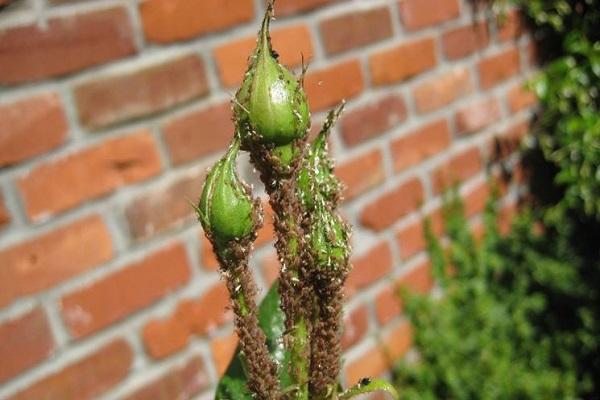

The same signs are observed in domestic roses when aphids are affected. At the initial stage, small white insects appear on indoor flowers. Later, their number increases, and larger green individuals appear.
Soap-based insecticides
Many homemade recipes mention soap as an additive. But, it can be used in its pure form or as a basic tool, and other components can be added to it.
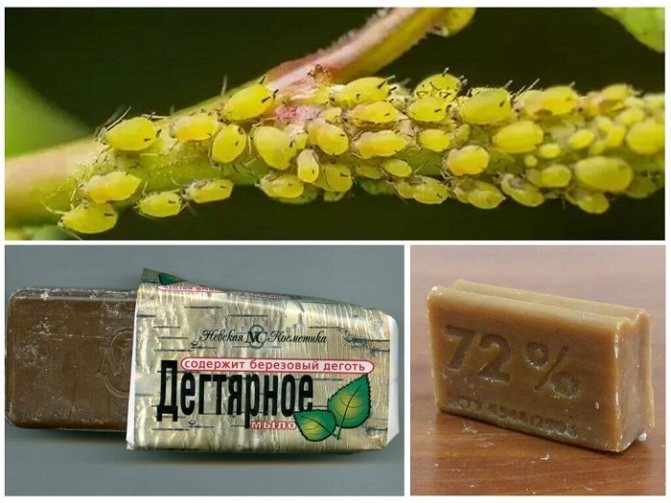

Photo 6. To prepare insecticidal solutions, you need a gray-brown laundry or tar soap with a pungent odor. Do not replace it with bleached flavored counterparts. Instead of scaring away insects, on the contrary, they can attract them.
Soap recipes are prepared from ordinary (laundry) soap or tar. Gardeners practice the following compositions:
- 300 g of dry grated soap (or 150 ml of liquid soap) - for 2 liters of warm water. Stir until the soap is completely dissolved. Before pouring into the sprayer - add up to 8 liters of water.
- Soap-soda solution:
- Soap - 50 g
- Baking soda - 1 teaspoon
- Water - 1 liter.
If you need a larger amount of funds, all components are increased proportionally.
- Soap-ash solution:
| Soap | 40 g |
| Wood ash | 200 - 300 g |
| Water | 5 l |
Cooking procedure:
- Pour the ashes with warm water and stir thoroughly until smooth.
- Brew the mixture over low heat.
- Add soap.
- After cooling, add water to 10 liters.
How to fight?
You can get rid of the pest on indoor and garden flowers both by folk remedies and by chemical and biological methods.
Folk remedies
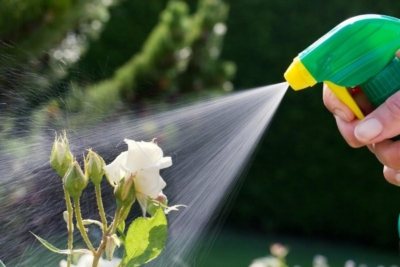

These are the most gentle and environmentally friendly measures for aphid control. Many products do not destroy pests, but scare them away from treated plants. They also fertilize the soil, are safe to use (if processed correctly), are available and cheap.
But there are also disadvantages to folk methods. So, preparations are quickly washed off by rain or watering and usually repeated repeated treatments are required.
Do not spray plants with any means on a bright sunny day, as burns may occur on the leaves (the drops are an imitation of the lens).
Basic recipes and methods of application:
- The most toxic of the popular methods is a solution of ammonia (ammonia). When using it, you must use gloves and a respirator. To obtain a solution, mix 2 tablespoons of ammonia and 50 g of grated soap in 10 liters of water, then pour a bush from a watering can. Repeat the procedure every 2 weeks (but use a freshly prepared preparation - ammonia quickly evaporates).
- Mustard will scare away both aphids and ants. Take 10 g of mustard per liter of water, insist in warmth for 2 days and dissolve in 5 liters of water. Spray the plant, repeat after a week.
Chemical and biological methods
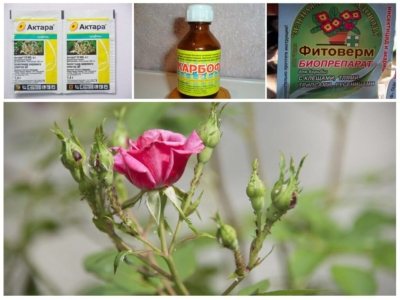

It is undesirable to use chemicals to combat aphids on roses. The specific smell of chemicals will interfere with the aroma of flowers. In addition, petals treated with chemicals cannot be used for cosmetic and culinary purposes. And do not forget about the danger of pesticides for crops growing next to roses.
But if, nevertheless, there is a need to use chemicals, they are easy to purchase in specialized stores. The main thing is to decide what exactly to spray the plants with.
- Inta-vir can be in tablets or powder. Rose bushes are sprayed with a solution of the drug before flowering.It can be used for both garden and indoor plants.
- Fitoverm brings minimal harm to the environment. Indoor roses are sprayed with them when aphids are found, and garden roses before flowering.
- Aktara is often used by gardeners. A solution of this agent is watered and sprayed on the plants. After watering, the drug is distributed over the tissues of the leaves and retains its effect for up to 2 months. The Commander and Confidor-extra are used in the same way.
- Contact preparations, such as Fufanon, Karbofos, destroy insects in contact with the solution.
- Intestinal chemicals: Akarin, Aktellik, Agravertin, Decis-profi, Aktofit.
When working with chemicals, be sure to protect yourself - gloves, a dressing gown, glasses, a mask on your face. At the end of the treatment, take a shower, change clothes.
The biological methods of controlling aphids include the use of natural enemies of these pests - birds and insects. When using pesticides, there is a high risk of destroying insects that eat aphids. To avoid this, you can water the roses with a stream of water from a hose for a week every other day. Aphids, washed away from the bushes, will drown, the rest will be eaten by insects. This method will help contain the reproduction and spread of aphids in the garden.
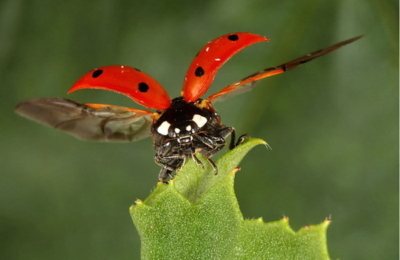

One ladybug can eat up to 250 aphids per day. They also like to eat aphids, lizards, wasps, hoverflies, aphid lion, ground beetles, lacewings, weevils.
You can also plant plants that attract beneficial insects. This will maintain a natural balance between beneficial and harmful insects and reduce the number of aphids. It is good to plant such plants as marigolds, lavender, garden buckwheat, calendula, thyme, sweet clover, fragrant dill, tansy and others.
How to process hibiscus?
Hibiscus, or Chinese rose, is popular with flower growers due to its endurance and ease of maintenance. But this flower can also be subject to aphid infestations, so every gardener should know how to process a Chinese rose. If the lesion is small, then a soap solution will be sufficient. In case of significant damage, it makes sense to use chemicals, for example, Inta-vir, Aktara.
Gardeners reviews
Valentina Alexandrovna (Morozovsk)
As soon as the leaves bloom on the roses in the spring, I immediately spray them with a soapy solution with ammonia. If this is not done, the aphid will necessarily appear. Some skeptics say that soap is outdated and washed off with the first rain. Nothing wrong! Preparing another is not at all difficult. And although I have a lot of roses, the sprayer is of a good brand, so I can process the bushes very quickly, even if I have to do it often. But, as a rule, three or four times are enough.
Pest types
It can be of different types, but all of them are united by high fertility and activity. On the plant, these bugs can be seen with the naked eye.
- White indoor aphid affects roses growing at home. Translucent, small, no more than 0.5 mm in size, these insects are capable of completely covering the entire plant in a short period.
- Mealy aphid prefers greenhouse roses. It has an oval body with a white coating and setae on the sides.
- Green rose aphid settles on roses growing in the open field. Usually these small green insects with brown antennae choose young shoots and buds for habitation.
Tobacco decoction for home plants
Spraying with soap or tobacco broth will also help. The most common tobacco for solution preparation is makhorka. Fill the tobacco with water at a ratio of 1:10 and soak for 48 hours. Then the infusion must be boiled for 2 hours. The resulting broth is a concentrate. Before spraying the leafy part of a room rose, it must be diluted with water in equal proportions.
You can spray a rose only 3 times with a break of 10 days.The tobacco broth should not penetrate the root system. This will cause the flower to wilt. The soil in the pot at the time of spraying should be covered with a sheet of paper or cling film.
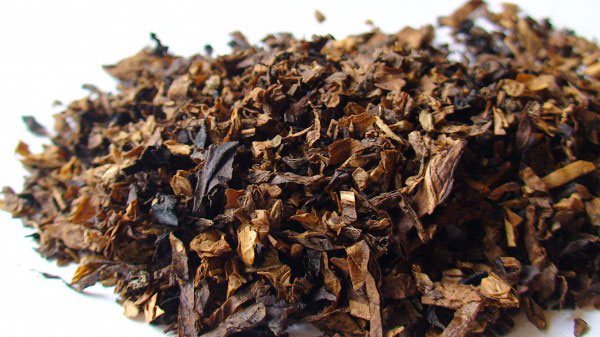

How to spray roses?
Just because traditional methods use natural ingredients doesn't mean you shouldn't be careful with them.
Wear a tight, long-sleeved shirt and gloves to protect yourself from the spikes. Set the sprayer to a wide spray, not a narrow spray. Although a strong jet can knock some of the insects off the plant, you need to wet the pest. On roses, colonies often congregate on the buds and undersides of leaves, so spray these areas thoroughly.
Spray the liquid from a distance of 30 cm, starting from the lowest point where you notice the larvae and moving up the rosebush. Apply every 5-7 days until the bushes are clean. The best time to spray is a calm evening, so you will not harm bees and other beneficial insects.
Try the home remedy selectively on one branch first so the plant responds well to it.
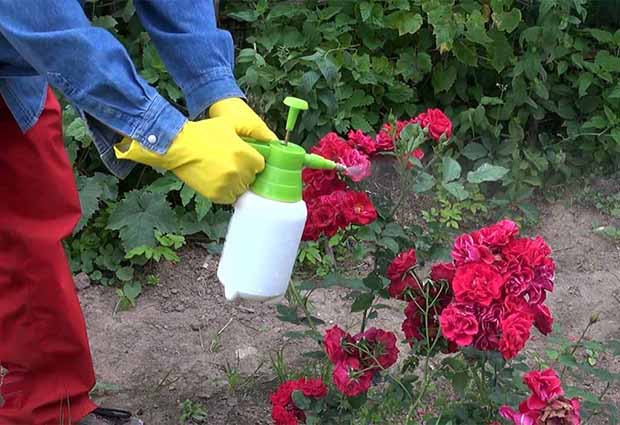

Aphid chemicals
Chemical preparations for indoor plants are used in the absence of a positive effect from the use of folk remedies. Purchased from specialized garden stores. The processing of the plant is carried out in a respirator and gloves.
Pesticides for plant protection.
Chemicals are available in powder or tablet form. Some of them are in the form of a solution in ampoules. Before processing, the preparations must be dissolved in water at the dosages indicated in the instructions.
- Fitoverm. Can be used during the flowering period.
- Aktara. Fast-acting insecticide, belongs to the 3rd class of toxic substances.
- Inta-Vir. Available in pill form. Treatment with the drug should be carried out at a temperature above 0 ° C.
- Spark Bio. The product contains natural ingredients.
- Dichlorvos and boric acid. The most demanded funds. For spraying with boric acid, 2 g of the drug should be dissolved in 10 liters of water. Dichlorvos is used in a bottle.
Karbofos can be used to kill aphids. The powder is pre-dissolved in water. The drug is toxic to humans.
When using chemicals, in most cases, 1 treatment is sufficient. Re-spraying is carried out, if necessary, observing the intervals according to the instructions. After processing, dead individuals should be removed from the plant.
Cons of chemical processing
Aggressive chemicals are highly effective, but over time, aphids can develop immunity to them. Therefore, in case of a repeated invasion of parasites, it is necessary to use another drug.
Chemical treatment of a home plant can be dangerous to animals and children, so the flower pot should be removed in a separate room or placed out of the reach.
Once processed, rose petals cannot be used for cosmetic or culinary purposes.
Another disadvantage of chemical treatment is the possibility of getting drugs on neighboring plants.
How soap products work
Soap kills aphids by removing the waxy protective layer that traps moisture in the body. At the same time, regular dish soap does not harm beneficial insects, including bees and ladybirds. Ladybugs eat aphids and control the pest population.
Rose bushes have a waxy surface that protects the plant from dehydration. Regular soap will dehydrate the leaves of the rose bushes. Special insecticidal soaps are safer for plants than dish soap, as they are specially formulated so as not to remove the waxy cuticle of the plant.
Many insecticides are chemically similar to dishwashing liquid.
Other ways than you can spray the bushes
There are still very non-standard options than to spray roses from aphids. Usually they are invented by individual gardeners through experiments. Not everyone wants to experiment on their own with home roses, so some people make video examples. Vyacheslav Alexandrovich, the author of the next two videos, did the same.
How to deal with aphids in the video is shown well, demonstrating the result immediately. The method may seem controversial. But in fact, this is a non-standard chemical solution with a low concentration and little danger for a person.
In this video, the author demonstrates a real folk remedy that is prepared in a matter of minutes. He obtained this solution through experiments. According to him, such a tool is very effective.
Choosing the right neighbors for roses in the country
Plants that attract aphids.
Some wild trees and shrubs intensively attract the pest to themselves, so it is not recommended to plant them either in the garden area or next to it.
Why is the company bad? Wild trees wake up earlier, throwing out their tender green shoots and flowers, and hungry insects rush to them from all around, starting their life cycle. At the moment when your roses wake up, the pest has already created a large population and is moving to your flower garden and garden. And in this situation, it is difficult to fight only with folk remedies.
In addition, there are popular flowers that also attract the pest. Of course, compared to shrubs and trees, they do it on a much smaller scale.
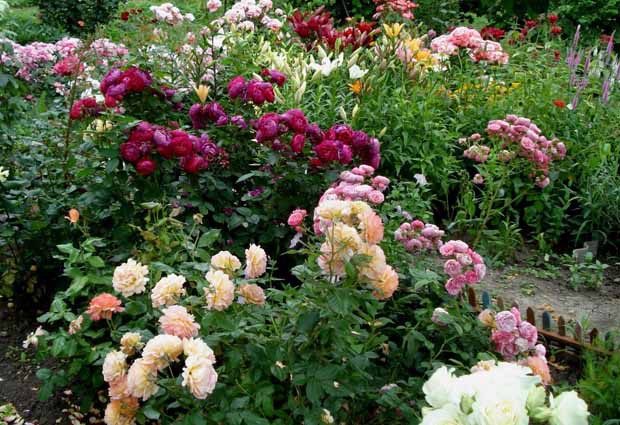

Allied plants against aphids
Let's look for helpers in our struggle among the plants. You can plant aromatic herbs and flowers that the pest does not like on the site next to the roses.
- mint, lavender, sage, thyme, dill, parsley and fennel
- marigolds and daisies.
Plants that distract aphids to themselves:
How to destroy aphids? Beneficial insects
Unlike ants, which carry the larvae of the pest throughout the garden, ladybugs help fight it. One such insect destroys about 700 aphids in natural conditions. We attract a ladybug to the site with tansy, dill or chamomile.
And if you have dandelions on your site, they will attract lacewings, wasps, ground beetles, wasps eating the pest and its larvae.
We set up poultry houses for sparrows, tits, beetles, etc. The birds feed on these larvae, and also feed their chicks with them.
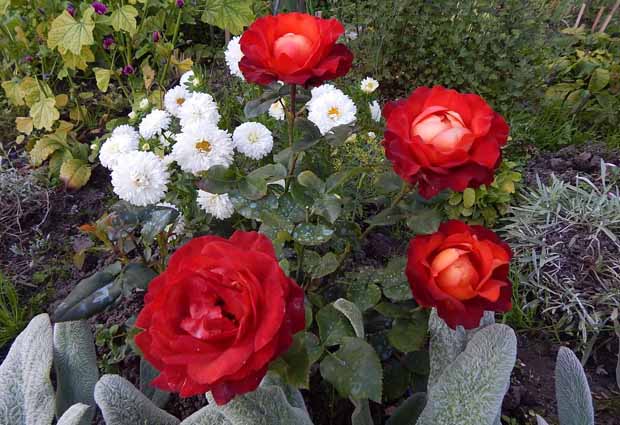

Toads will save roses from aphids and ants
Having toads in the garden is a wonderful method: aphids and ants will simply disappear. Toads love these insects and will hunt them. As long as there are toads in the garden, you can simply forget about pest control.
To attract toads, place bowls of clean water in the shade under trees - they need to have a drink. This method is used in the largest rose gardens in the world.
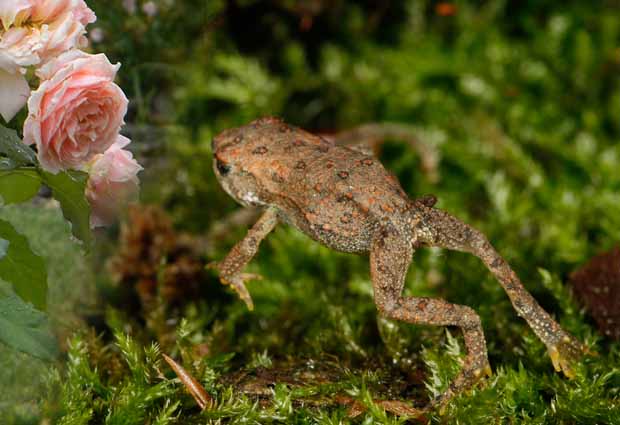

Changing control methods keep insects from being resistant to a specific toxin. Alternate all the ways you know how to deal with rose pests. If one method is used predominantly, the surviving individuals pass on their qualities to the new generation, creating a more stable population.
Usually, after the first aphid invasion in May-June has been successfully repelled, natural predators such as ladybugs, wasps and toads help keep the number of insects in the garden under control.
What folk remedies do you use for aphids? Do you think that all purchased drugs are more harmful?
Even the best folk remedies can dehydrate the surface of the rose leaves (they wash away the moisture-retaining wax film from it as well as from aphids) and can harm beneficial garden dwellers, for example, bees. Therefore, only treat areas where there are aphids, and sometimes it is more effective to simply wash off the larvae with a sponge and soap than mindlessly spray the entire rose bush.
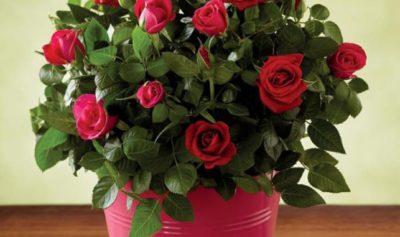

Luxurious roses are the pride of any florist.But in order to preserve the beauty and health of an elegant flower, it is necessary to timely and correctly respond to diseases or the appearance of pests on the plant.
The rose can be affected by various parasites: spider mites, caterpillars, rosacea scale insects, thrips. We will tell you how to deal with chemical and folk remedies with one of the most common pests - aphids, found in almost all garden and home plants.
Advice
Avoid using chemical pesticides. The drugs are deadly to aphid enemies such as ladybirds, hover flies and parasitic wasps.
Compliance with simple care recommendations will help protect the flower culture from aphids:
- Observe the constant care of your roses. Remove weeds from the flower garden in time, inspect the plant for pests.
- Plant nearby plants with strong odors that are unpleasant for aphids. These include: mustard, dill, marigolds.
- Do not wait for pests to settle on flower bushes, make preventive spraying with folk remedies.
- Destroy ant colonies in time that bring aphids to the site.
Spring treatment of roses from aphids
At the very initial stage, it is necessary to water and spray the plants in the spring. It is during this period that insects wintering in the roots of plants wake up, they can attack weakened rose bushes.
Instructions:
- To prevent this from happening, before the budding begins, it is necessary to process the roses. This is best done with urea.
- For this, 500 g of the substance is dissolved in a 10-liter bucket of water. The liquid should be slightly warm.
- Watering the plant at the root is carried out. Further, after a week, it is necessary to carry out processing copper sulfate... To do this, 200 g of the substance is dissolved in a 10 liter bucket of water and irrigated.
After that, as soon as the buds have blossomed, it is best to carry out processing using a kind of mixture that allows you to feed the plant, as well as remove the first signs of the appearance of aphids and other insects on flowers. To do this, mix in equal amounts Aktara, Karbofos and Ruth, diluted with water and sprayed plants. Such treatment helps to remove pests that remained alive after wintering, and also prevents the occurrence of fungal diseases. This is true when the air humidity is high, which often happens in spring, after the snow has melted.
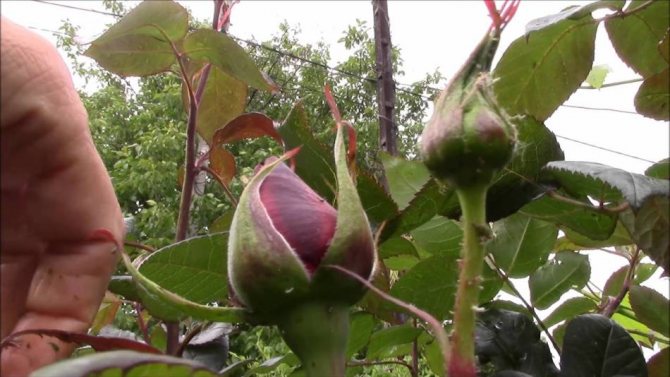

Pests on roses
How can aphids be prevented?
Rose is one of the most difficult crops to care for, but with the observance of the rules of hygiene and maintenance, the appearance of parasites can be avoided.
Prevention methods include:
- timely pruning of dry leaves;
- airing the room;
- keeping the flower in a bright place;
- feeding with fertilizers;
- preventing the appearance of ants in the house;
- checking purchased bouquets, pots and soil;
- transplanting new plants into fresh clean soil.
Growing a rose requires regular rinsing of the top of the plant, maintaining an optimal indoor temperature, and timely watering.
When growing crops in the open field, timely care of the garden is necessary, because parasites can appear on neighboring plants. With careful care, the rose will become a spectacular decoration of a room or a garden plot.
How to process the Chinese variety?
The Chinese rose (hibiscus) is distinguished by a variety of species, and the fairly simple care and endurance of the flower made it popular among flower growers. But, like all roses, hibiscus is not protected from the invasion of aphids.
To get rid of aphids on a Chinese rose, you can use the pest control methods described above. In case of minor lesions, it will be enough to treat the plant with soapy water.If the affected area is large, then chemical agents (Aktara, Inta-Vir) can be used in accordance with the instructions for use.
The use of chemicals
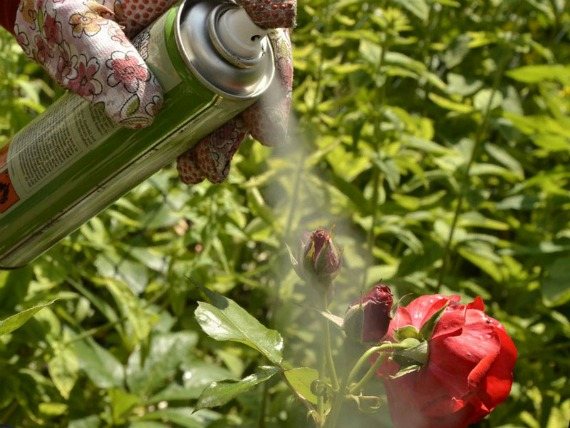

Often, in order to achieve greater efficiency and with a massive defeat of rose bushes by aphids, it is necessary to resort to chemical control measures. But it is advisable to take into account the location of the rose garden and use chemicals near fruit bushes and trees and near vegetable beds, the fruits of which are already ripe and ready to eat.
The following chemicals are used to treat roses:
- "Karbofos";
- "Fufanon";
- "Lightning";
- "Bi 58";
- Aktara;
- Actellik;
- "Decis";
- Kinmix;
- "Spark".
Chemical preparations give a 100% guarantee of the death of the pest on roses, but they are also dangerous for beneficial insects, birds, domestic animals and humans. Therefore, during the processing of flowers, it is necessary to use personal protective equipment: a respirator, glasses, a hat, gloves.
Another significant disadvantage of this method of treating roses against aphids is that rose petals cannot be used either in the preparation of medical and cosmetic products, or in cooking.
In rare cases, the use of chemicals can change the smell of flowers.
On a note. Aphids hatch a new generation every 2 weeks, so the pest quickly adapts to the active substance. The effectiveness of the fight will lie in the alternation of drugs.
In addition, it is necessary to carry out intermediate treatments with folk remedies and not neglect mechanical methods.

